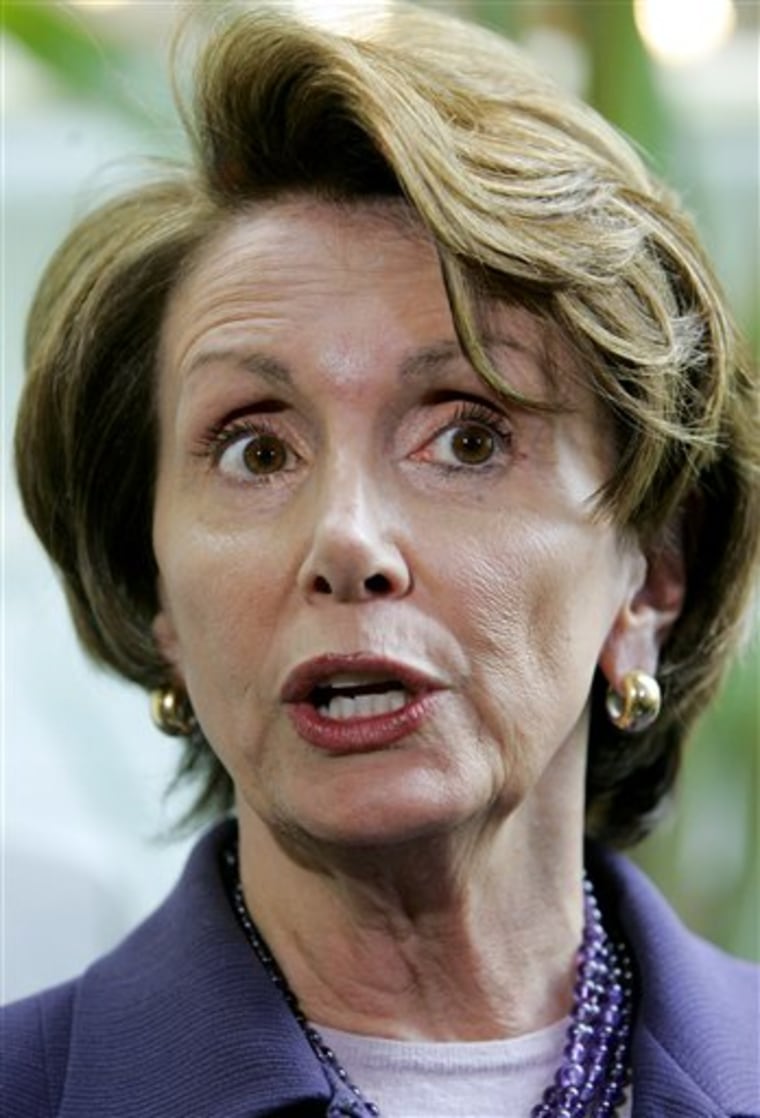People think the Democratic-led Congress is doing just as dreary a job as President Bush, following four months of bitter political standoffs that have seen little progress on Iraq and a host of domestic issues.
An AP-Ipsos poll also found that House Speaker Nancy Pelosi is a more popular figure than the president and her colleagues on Capitol Hill, though she faces a gender gap in which significantly more women than men support her.
The survey found only 35 percent approve of how Congress is handling its job, down 5 percentage points in a month. That gives lawmakers the same bleak approval rating as Bush, who has been mired at about that level since last fall, including his dip to a record low for the AP-Ipsos poll of 32 percent last January.
"It's mostly Iraq" plus a lack of progress in other areas, said Rep. Tom Cole, R-Okla., who heads the House GOP's campaign committee. "These are not good numbers for an incumbent, and it doesn't matter if you have an 'R' or a 'D' next to your name."
Iraq, gas prices and wrong track
Democrats agree that the problem is largely Iraq, which has dominated this year's session of Congress while producing little more than this month's Bush veto of a bill requiring the withdrawal of U.S. troops. It has also overshadowed House-passed bills on stem cell research, student loans and other subjects that the White House opposes, they say.
"People are unhappy, there hasn't been a lot of change in direction, for example in Iraq," said Rep. Chris Van Hollen, D-Md., chairman of House Democrats' campaign effort.
Rising gasoline prices could also be a factor, lawmakers said.
In another measure of popular discontent, the survey found that 71 percent say the country is on the wrong track - about even with the 73 percent who said so last May, the worst level since the AP-Ipsos poll began in December 2003.
The survey was taken Monday through Wednesday, before Bush offered to seek compromise with congressional Democrats over a war spending bill setting benchmarks for progress in Iraq.
Bush told reporters Thursday that if pollsters had asked his opinion about Iraq last fall, "I'd have said I disapprove of what was going on in Iraq. They could have put me down as part of the disapproval process."
That was before his decision to send nearly 30,000 additional troops to Iraq, which "would more likely cause me to approve of what's going on in Iraq," he added.
GOP disenchantment
Overall approval of Bush was steady from last month, but fell to 69 percent among Republicans, about 7 percentage points below where it had been in April. Earlier this week, a group of GOP moderate House members warned Bush that the status quo in Iraq could mean Republican election losses next year.
"If the war doesn't begin to turn around, Republicans will have problems," said Rep. Peter King, R-N.Y., who said he supports Bush's Iraq policy.
White House spokesman Tony Snow declined to comment on the poll.
Congress' approval rating this week was 10 points higher than a year ago, when Republicans were in control.
But after bumping up in April, this month's drop left lawmakers' job approval where it was when the year began. April saw Congress defy Bush and send him a bill financing the war and requiring a troop withdrawal, which he vetoed May 1.
Congressional disapproval
"People wanted change in Washington" on many issues, not just Iraq, said Rep. Rahm Emanuel, D-Ill., a member of the House Democratic leadership. "I'm not surprised about where people are. They're hearing only about Iraq."
Congress' reduced appeal was evident in several categories of people. Only 48 percent of Democrats said they approved of Congress, down from 55 percent last month. That included a 12 percentage point drop among Democratic women, though support from Democratic men remained steady.
Approval by minorities also fell a dozen points to 39 percent, with a similar reduction among people whose family incomes exceed $75,000.
By region, the steepest drop was in the Midwest, where approval fell by 10 percentage points to 28 percent. Congress' highest approval was in the Northeast, where four in ten gave it a positive rating.
Pelosi, women and minorities
As for Pelosi, D-Calif., her overall approval of 45 percent stood 10 points higher than Bush's and Congress'.
She was seen favorably by 52 percent of women, but only 39 percent of men. While whites are closely split about her, minorities approve of her job by a 15-point margin.
Pelosi's numbers are about where she was last month but slightly lower than in January. In the last month, she has lost significant support from younger voters, college-educated women and Westerners.
"Voters are frustrated by the fact that the president refuses to change direction on Iraq," said Pelosi spokesman Brendan Daly.
Bush's approval ratings are lowest for his handling of Iraq and domestic issues including health care, with about one-third seeing him favorably. About four in 10 like the job he is doing on the economy and foreign policy.
Men give the president higher grades than women do, whites higher than minorities, and married people higher than singles.
The AP-Ipsos survey involved telephone interviews with 1,000 adults. It has a margin of sampling error of plus or minus 3 percentage points.
